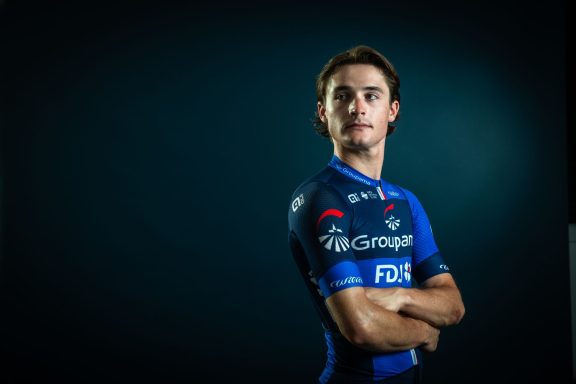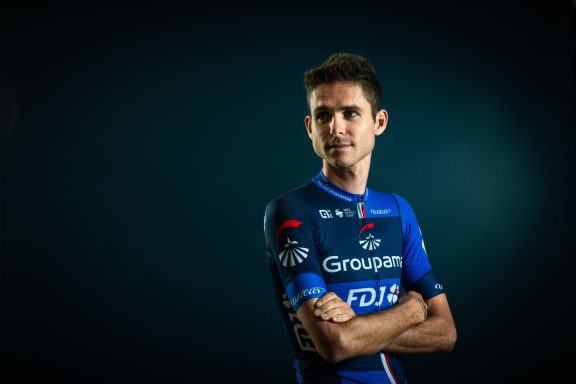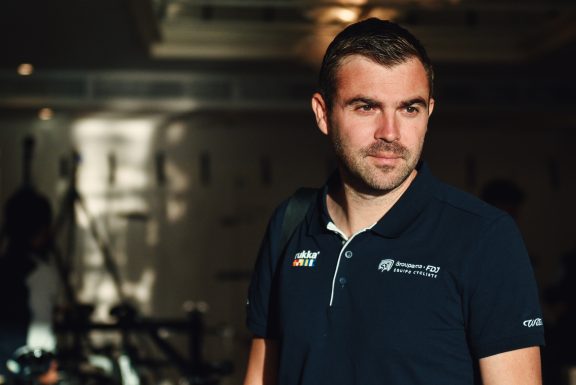The 2021 season of the Groupama-FDJ cycling team came to an end on October 17, with Stefan Küng’s victory on the Chrono des Nations. That made the tally go up to 24 wins in a year made of ups and downs, which Yvon Madiot agreed to assess before fully embarking on preparations for the new season. He also did not miss commenting on the signings for 2022.
Yvon, if you had to give the team’s season a mark, what would it be and why?
I would say 6/10, just above average. Why? I could have said 5/10 actually, but I added one point because we still won a lot of races. However, I cannot go beyond that because we did not win on the Grand Tours. The Tour de France was average, and although we showed good things as well, we wanted to get at least a stage win and we didn’t succeed. I don’t think we deserve more than 6/10. We really lack this victory on a Grand Tour. We often say that the Vuelta helps save the record, but we didn’t succeed either. I go slightly higher than the pass mark, but it is still rather an average mark and I think we cannot claim for more.
“We are going to question ourselves”
The season is now over for a month. What is your main feeling about it looking back?
The feeling that something is missing: the victory or the result we remember of. Whether it be on the Tour, on the Classics … Maybe all we lack is THE victory. A stage win on the Tour and we might have thought about everything a bit differently. We feel there is unfinished business, despite everything else we have done. It’s frustrating. For me, it’s crystal-clear: the season isn’t really successful. There are obvious failures. The Tour was one of them. We expected a lot, we thought we had the team to be able to win on a lot of terrains. Stefan finished second on a stage, beaten by the last rider to start. It comes down to details. I insist: we lack this memorable victory. This memorable victory is also the one that makes you spend the winter in peace. We don’t have it, so it makes us spend the winter with a feeling of revenge and self-questioning. I do not tell myself “it will be better tomorrow”. No. It just wasn’t as we hoped and we’re going to work to make sure it doesn’t happen again, and that it improves quickly in the next year.
Is the balance especially disappointing with regard to the team’s ambitions?
We are indeed disappointed with our record because we were used to regularly winning on the Grand Tours in recent years. Of course, we shouldn’t be too pessimistic either. Many teams could be satisfied with twenty-four wins in a season. However, considering our level of organization, the qualities and skills we have among the staff and the riders and how much our investment is, we cannot be completely satisfied with a season like this one. Our partners also provide us with all the means to succeed. From this point of view, our results did not match our skills and what we are putting in place. There is a little discrepancy, a little something missing. We are working on it, we have paths for reflection, improvement, and we have carried out useful debriefings. We are going to question ourselves, all of us, at every level, to go and get victory or victories that remain and make a season a success.
How do you explain this “average” season?
Firstly, I would say that we couldn’t approach this season the way we like to, with a big gathering in December. The health situation forced us to separate into different groups. We really missed this gathering, where we all meet up, where we can discuss. It was especially true for the staff, as this came up a lot in the debriefing. Perhaps we thus entered this season with a little less control. With Thibaut’s long absence, we were not always able to line up the teams we wanted. It was also a real problem, although we can’t make it our only issue. The other riders must also be able to step up in this context. We missed Thibaut, sure, but we also realized that we didn’t have so many riders capable of winning at a very high level either. On the Tour, we practically lost Arnaud after three days. It obviously ruined our plans. Once he was gone, we knew our chances of winning were greatly reduced. In other races, we also noticed our trouble in performing at the highest level. When our leaders had issues, it was difficult to perform.
“The riders didn’t give up”
Starting the season, Marc said he wanted “to be in a position to go for victory at each race start”. Was this will fulfilled?
No, quite clearly. In some races, we knew at the start that we had little chance of winning. It’s not the best situation, although you always have hope, you think there is necessarily a solution, going from far… We lacked a few “winners”. We also know we face competition, that we cannot recruit whoever we want, for financial or sporting reasons. We can’t take the twenty best riders in the world like some teams do. Without talking about leaders, we realized that we lacked riders who can win when the leader is in trouble. We won relatively consistently, with no big gaps in the calendar, but let’s say there was no euphoria. We won frequently, but not always at the level we hoped for. David Gaudu, for example, had a great period between the Basque Country and the Ardennes, but we couldn’t repeat it.
Was it necessary to close ranks at some point?
There was indeed a remobilization after the Tour de France. It surely was complicated to turn things around, but our job was to make the riders aware that we were on for a difficult season, but that we shouldn’t give up. The watchword was not “move it, we need results”. It was more like “It’s hard, but don’t let go, keep pushing, keep believing”. We didn’t have a knife to our throat either, but we were in a situation where we shouldn’t give up. The riders were fully aware of this as well. After the Tour, we also wanted to change our approach a bit. We needed to be aggressive, to try things. These are really the instructions we gave to each group. We especially did not want for the season to end badly and for the guys to lose morale. We told them “we keep committed to you, and you, don’t give up!” And they didn’t.
Is that one of the season’s satisfactions?
Yes, because it shows that our riders kept fighting. It was easy to deliver the message, but it still needed to be heard and acted upon, and for it to lead to reaction and responses. We could very well have had the same recommendations, the same speech, but with runners unable to react. It would have been much more serious.
“The prospects are promising”
What are the other satisfactions?
There are several of them. There is the fact that David is getting to the level we expected, with this stage victory on the Tour du Pays Basque, his third place on Liège-Bastogne-Liège, his performances on the Tour… It is something important because we know that we can count on him for the greatest races, while he is slowly coming into his best years. He had real consistency and gave us visibility all year round. Among the positive points, we obviously have Thibaut’s comeback. It’s easy enough to point out, but he’s just as important for the results, the victories, as he is for the squad in general and the motivation he brings. Arnaud won nine times, and his victory over Paris-Tours did us a lot of good. There is also the consistency of Stefan Küng, both in results, but also in his commitment to the team. He’s a rider to lean on. It’s a sure bet and a driving force, both literally and figuratively, for this team. He is obviously a rider who is very committed to time trials, but who is also committed to supporting the leaders, to the equipment development, to the team progress as a whole. He’s already become a really important centrepiece for us. Our leaders continue to improve, and we got one “back”… Therefore, we should be in a more comfortable position next year.
Among the satisfactions, we could also mention, among others, Attila Valter’s pink jersey, Jake Stewart’s podium on the Omloop Het Nieuwsblad…
I would classify these performances in the “hopes” category. They make us confident in the fact that we possess some young riders who should be performing very quickly. This brings us to the Conti, which is doing an excellent job and which we are starting to take full advantage of. I think we can almost dream of recruiting almost exclusively from the Conti in two or three years. The prospects are promising.
“We are going to intensify exchanges with the Conti”
Has the WorldTour/Conti cooperation also been a success?
Absolutely. The management of the two teams with the exchanges was very interesting and will be further developed. A few WorldTour riders also went with the Conti and totally played along. It’s as important as the other way around. When you ask a young rider to come and race with the WorldTour, it is necessarily motivating. You would think that it is a little less in the other way, but Sébastien and Miles really felt the good it did to them, and the good it did to the Conti. Our biggest job, as we are going to intensify these exchanges, will be to build a real program. It would be a mistake and disrespectful towards the Conti to call on the youngsters to fill in the holes, even if it can happen occasionally. The wisest and most beneficial thing to do is to build a program so that it is established that these young riders come to race with the WorldTeam on given dates. We have already started doing it this year. In 80% of cases, places were blocked for them. The Conti riders sometimes had priority over the WorldTour riders. If we want to see the fullness of their potential, we must work with the staff of the Conti to establish a program that is as coherent as possible. For it to be productive, for us but above all for them, it must be planned. We must put them in good conditions to judge them, because they are potential recruits for the future.
As Lewis Askey will be this winter…
As early as May, we decided we would make him pass to the WorldTour. When I called him to tell him, he said, “No, I don’t want to because I didn’t win a race with the Under23”. I was a little surprised, but I told him it was not important to me. I offered him a position in the Classics’ team, as we want to rejuvenate it. And he understood. We don’t just focus on results. Lewis came to do some races with us in Belgium, and we found him to be extremely good. Again, it worked well because it was planned in Lewis’s schedule for a long time, as his coach needed to prepare him as well as possible for these races.
“Michael Storer has the profile we were looking for”
Lewis Askey is the only rider from the Conti to join the WorldTeam. Was it too complicated to make room for everyone?
Only a few riders left us this year, and we can’t only take youngsters from the Conti, because we also have to bring a little experience and resistance for the WorldTour. I think there will be more opportunities next year. We have also reduced our roster from 30 to 28 riders. There are a lot of talents within the Conti, and so much the better. We won’t always be able to keep them with us, it is logical and part of the game.
What was your approach in terms of recruitment?
We were looking for two profiles: climbers and sprinters. The climber profile is extremely popular and sought after. We had two great opportunities, which concluded fairly quickly because we had in front of us riders who wanted to come. In the case of Michael Storer, his agent called us and said he wanted to come and work with us. This is the profile we were looking for, namely the climber capable of accompanying our leaders very far, and when they are not there, of performing individually. That’s what he showed with his former team. We also had the case of Quentin Pacher, with whom we had already discussed two years ago. He wanted to come, we wanted to recruit him, because he is an offensive but also a perfectible rider. He has followed a regular course, and during his interview I discovered a thoughtful, composed, mature man, who had good knowledge of his work. We are sure to have a solid rider, who can take on various roles. We also hope that he will continue to improve. As for Bram Welten, he contacted us himself. He wanted to join a big train while having his chance from time to time, without claiming a leader status. He is still young, and he can be a nice surprise for 2022. He wants to learn alongside Arnaud, Jacopo, Ramon. He has a different profile from Jake, who is more of a Classics sprinter, after a tough race. There are high-performance riders on the market, and we don’t look at whether they are French or not. For me, it’s not important. We try to build the best possible team. If the skills are on the other side of the border, we have to go get them as well.



No comment